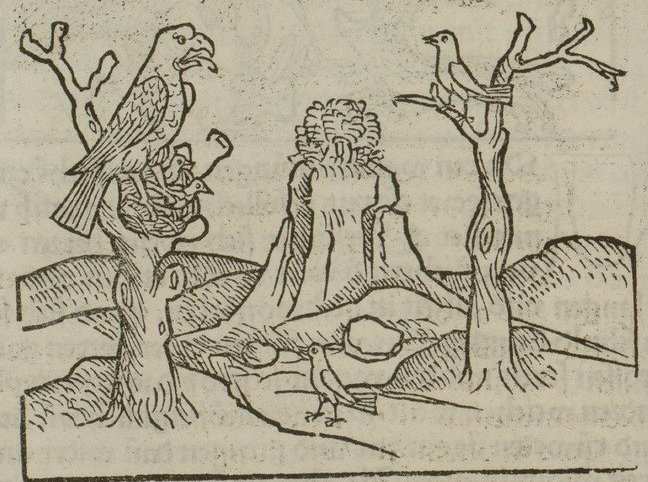Today's fable is Perry #4, the story of the the nightingale pleading with the hawk to let her go. I'll also be commenting here on Perry #567, a variant form of the fable. At the Aesopus wiki, you can see a complete list of the versions of this fable that I have collected. It is quite intriguing that Perry assigned two different numbers to the different "branches" of this fable, as there are other instances where he freely compiled widely differing variations under the same number.
In Perry #4, the tradition begins with the ancient tradition in Hesiod's Works and Days of the nightingale caught by the pitiless hawk. The nightingale begs for mercy, but the hawk only scoffs at her and boasts of his power. In some versions, the hawk pronounces a moral along the lines of "a bird in the hand is worth two in the bush." Alternatively, the nightingale may offer to sing to please the hawk, but the hawk insists that what he needs is food, not amusement. Those are both very practical morals, often endorsed in Aesop's fables, so the hawk is both a villain and a pronouncer of wisdom. Perry does not list any Latin examples under the heading of Perry #4, although I have found some modern Latin examples, such as the version here in Abstemius:
Luscinia, ab accipitre famelico comprehensa, dummodo se ab eo devorandam esse intelligeret, blande eum rogabat, ut se dimitteret, pollicita pro tanto beneficio ingentem mercedem se relaturam. Cum autem accipiter eam interrogaret, quid gratiae sibi referre posset. Aures, inquit, tuas mellifluis cantibus demulcebo. At ego, inquit accipiter, malo mihi ventrem demulceas. Sine tuis enim cantibus vivere, sine cibo non possum. Haec fabula innuit utilia iucundis anteponenda.
In Perry #567, first attested in Ademar, there is a sense of divine justice at work. The hawk has caught the nightingale's chicks in the nest and pretends to make a bargain with the mother: he will spare her chicks if she sings a pretty song. The nightingale sings, but the hawk accuses her of singing an ugly song, and then beings devouring her chicks. Just at that moment, a bird catcher approaches and catches the hawk. Although we do not have a version of this fable in Phaedrus, it seems to me absolutely typical of the kind of story variation that Phaedrus would introduce, so I would concur with the scholars who believe the medieval versions we have of this story represent a lost version by Phaedrus. Thanks to its inclusion in the medieval tradition, this is the version that made its way into Steinhowel's Aesop, so here is the version in Steinhowel's Aesop:
In nido lusciniae cum sederet accipiter, ut specularetur auras, parvos illic invenit pullos. Supervenit cito luscinia et rogavit parcere pullis suis. Faciam, quod vis, inquit, si bene mihi cantaveris. At illa, quamvis animus excederet, tanto metu coacta, pavens et dolore plena cantavit. Accipiter, qui praedam invenerat: Non bene cantasti, inquit. Et apprehendit unum de pullis ac devorare coepit. Tunc ex diverso quidam auceps venit et calamo silentio levato accipitrem visco contractum in terram deiecit. Si qui aliis insidiabatur non cavit, ideo captus est.
Here it is written out in segmented style to make it easier to follow, while respecting the Latin word order:
In nido lusciniae
cum sederet accipiter,
ut specularetur auras,
parvos illic invenit pullos.
Supervenit cito luscinia
et rogavit parcere pullis suis.
Faciam, quod vis, inquit,
si bene mihi cantaveris.
At illa,
quamvis animus excederet,
tanto metu coacta,
pavens et dolore plena
cantavit.
Accipiter,
qui praedam invenerat,
"Non bene cantasti," inquit.
Et apprehendit unum de pullis
ac devorare coepit.
Tunc ex diverso
quidam auceps venit
et calamo silentio levato
accipitrem
visco contractum
in terram deiecit.
Si qui aliis insidiabatur non cavit,
ideo captus est.
My favorite part of this story is the poor nightingale who does her best to sing a song to placate the hawk, but who is so distressed that she cannot sing her usual song, so that the hawk thinks she has failed to live up to her end of the bargain, providing a "justification" as it were of his cruel deed. That seems to me an insightful psychological portrait of what some bullies are like indeed.
For an illustration, here is an image from Steinhowel's Aesop which shows hawk in the nest, and the nightingale attempting to sing:

For more information about subscribing to this blog via RSS or by email, visit the Bestiaria Latina blog using the link provided here.
No comments:
Post a Comment